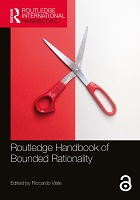Routledge Handbook of Bounded Rationality
Proposal review
Abstract
The ongoing process of digitalization seems to be changing our world dramatically. While many of these changes might lead to improvements for human well-being, others might entail profoundly disastrous consequences both for individuals and for societies as a whole. One research program that might be particularly suitable for studying environmental changes is the fast-and-frugal heuristics framework. This theoretical framework adopts an ecological perspective on human behavior, cognition, and performance. In an uncertain world, humans, so the argument goes, can adaptively respond to environmental demands by relying on a repertoire of simple decision strategies, called heuristics. Selecting heuristics that fit the environment results in adaptive behavior. This chapter focuses on the possible negative aspects of digitalization to discuss how the science of heuristic decision making under uncertainty might aid reflection on how individuals navigate their way through sudden, disruptive, and thorough environmental changes. Specifically, it sketches out what aversive future digital environments might look like, and which heuristics individuals and societies might rely upon in order to manage those aversive environments. The chapter concludes by (1) pointing to a series of research questions about how digital environments might differ from other environments that we humans have encountered both in our more recent history and over the course of our evolution, as well as (2) turning to questions about children and education.
Keywords
digitalization; heterodox economics; heuristics framework; ecological perspectives on human behaviour; heuristics; economic uncertainty; environmental change; digital environmentsDOI
10.4324/9781315658353ISBN
9781138999381, 9780367563943, 9781315658353Publisher
Taylor & FrancisPublisher website
https://taylorandfrancis.com/Publication date and place
2021Imprint
RoutledgeClassification
Business and Management
Economic history
Economics
Economic theory and philosophy
Finance and the finance industry

